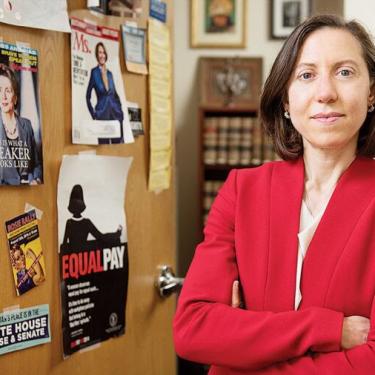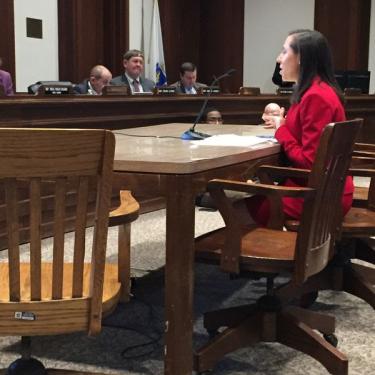
During this time of Holy Week for many of our Oriental and Eastern Orthodox sisters (and brothers) who follow the same calendar, all focus is on Christ, who was unjustly accused and executed. Our Woman of the Week is a lawyer focused on social justice--in her case through labor law. Her name is Rebecca Pontikes. We caught up with her while she was transitioning her office to deal with COVID-19 and asked how she decided to pursue this particular career:
"My father, who is also a lawyer, influenced my decision to be a lawyer as well as the type of work that I do. My father worked for the American Civil Liberties Union when he first finished law school (in 1961) and, even after going into private practice, continued to shape his work around those who were left behind by society or who were less powerful and wronged by the more powerful. For their first date, my father took my mother (a landlord’s daughter) to a rent strike that he organized. My father was also active in the church, serving on the parish council and still being active in the Orthodox Christian Laity organization (even at 83!). His practice reflected how he thought Jesus Christ would want him to live his life and to practice law.
"I wanted to have a career through which I could help people, and the example set by my father made me decide that I wanted to be a 'cause' lawyer. My legal practice is focused on employment law, in particular, the challenges women face in the workplace. I became a radical feminist in college after having spent a semester in Washington DC working for a senator. It was right after the hearings to confirm Justice Clarence Thomas, and I was aghast at the naked disbelief that people showed for Professor Anita Hill’s brave testimony about the sexual harassment she experienced. I began to take more women’s studies and history classes in college and became aware of the historical challenges faced by women to work and support themselves and their families. Radical feminism is the philosophy that our social structure is a patriarchy which favors masculinity and should be restructured to stop favoring masculinity. From what I had learned in church and by reading the Bible, favoring men did not seem to be in keeping with what Jesus Christ wants for us. Following my father’s example, I wanted to focus my practice on bringing justice to women. I believe that radical feminism is in keeping with the teachings of Jesus.
"Not to leave my mother out of the equation, I grew up listening to her frustrations about how the care-giving work she did, for me and my sisters and my father, was not valued. My mother was frustrated with the feminists because she felt they did not value her or her work in our home. As I got older, I became acutely aware of how her work would leave her impoverished in her old age because it was not the type of work that earned her social security benefits or allowed her to save for retirement through a private retirement vehicle. The importance of work in our society, particularly the dependence of stability and social welfare on working, led to my decision to become an employment attorney." Axia!
Our Woman of the Week is Rebecca Pontikes, a labor lawyer nominated for her work on workplace issues to protect care-givers. You see her here testifying for the Federal Pregnant Workers Fairness Act.We asked her what her current practice looks like and why:
"As a feminist, I want to focus my practice on the particular challenges women face in the workplace because of overt or implicit sexism. The workplace is still administered and structured to assume that a man is doing the work and that his wife (or a woman he hires if he has no wife) is caring for his family or personal needs. Care-giving, in our society, is assumed to be a task for females (some would argue is a natural and biological drive of females) and employers treat it as a negative appendage of women as workers. Women are seen as poorer workers because of it. For women to get an equal chance to thrive in the workplace, caregivers—people who care for children, family members, elders—have to get justice at work. Note, I do not say equality. Equality, in the sense that the employer would treat either a man or a woman in the same (penalized) way, will not give women an equal chance. There has to be justice. Employers have to take responsibility for setting rules that do not penalize care-giving. They also have to take responsibility for not enforcing rules that penalize care-giving.


"Some examples are pregnant women who are fired because they ask their employers to give them a temporary accommodation while their bodies experience the changes of pregnancy. It could be that a stockroom clerk asks that she not have to climb ladders during the last few weeks of pregnancy or that a truck driver ask that others assist her lifting heavy items on to her truck. It could be that a cleaning woman at a hotel asks that she not have to handle toxic chemicals during her last weeks of pregnancy. But care-givers are not limited to women caring for children. Other examples are people who have to care for parents who are aging and are suffering from illnesses like Parkinson’s disease or Alzheimer’s disease. It could be someone caring for a spouse who needs an operation.
"My philosophy does not exclude men from my practice. It includes and welcomes them. Men can be care-givers, and many men have the natural instinct to be caregivers that all women are assumed to have. When employers penalize men for 'acting too much like a girl' they reinforce the erroneous notion that men do not have, or should not have, any responsibility for caring for their loved ones."
We asked our Woman of the Week about her morning routine:
"My mornings start at 4:45am. I get up and get dressed to go to the gym. I say the Jesus Prayer ('Lord Jesus Christ, Our Redeemer, Have Mercy on me') as I dress and make my way to the gym. I do this as a meditation, praying for wisdom and understanding for the challenges I will face during the day. I also ask Christ to give peace, love, and light to my husband, family, and friends. I finish with the Lord’s Prayer and the Prayer of St. Ephram. While I do this, I try to connect with my body and my heart center.
"When I get to the gym, I do either a strength training, spin, or mixed class. I’m a small person (I am 5’ 3/4” tall and weigh about 107lbs), so it has always been important to me to be strong and have a healthy body. After the gym, in the winter time, I go to my office (I work for myself) and have breakfast. I pause before I eat to extend gratitude to those whose work made my breakfast possible (the workers who farm, pick the food from the ground, drive the food to the store, work in the factories which make the food, and work at the store). I usually meditate after breakfast for about 15 minutes (good thing I work for myself!).
"I know it sounds like a lot. My profession is a stressful one. It’s adversarial by nature, and because I own my own business I have to also do work to run the business (which does not produce revenue). Both the practice of law and the business running are two separate, and stressful, jobs. Carving out time in the morning for spiritual connection with Jesus and for keeping connected to myself is essential to care for myself. I can’t care for others, or do the work I believe Jesus wants me to do, if I do not take the time to care for myself. If that means less work in volume gets done (and I don’t believe that this is true) than so be it."
Thank you, Rebecca!



